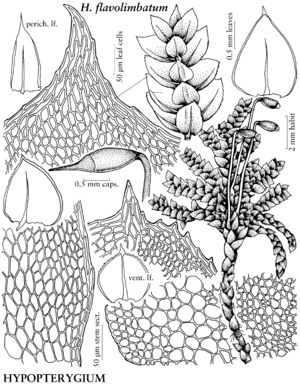familyHypopterygiaceae
genusHypopterygium
Show Lower Taxa
Hypopterygium
Bryol. Univ. 2: 709. 1827.
Etymology: Greek hypo, beneath, and pterygion, small wing, alluding to underleaves
| Taxon | Illustrator ⠉ | |
|---|---|---|
 | Hypopterygium flavolimbatum | Patricia M. Eckel |
Plants pale green. Stems pinnate, flabellate, palmate, or umbellate, rudimentary branches absent; stipe cavities absent. Leaves margins bordered by 1 or 2 rows of long-rhomboidal cells; apex acute or acuminate; costa of lateral frond leaves ending before apex; laminal cells rhomboidal, prosenchymatous, walls thin or weakly incrassate. Specialized asexual reproduction absent.
Distribution
North America, Mexico, West Indies, Central America, South America, Europe, Asia, Africa, Indian Ocean Islands, Pacific Islands, Australia
Discussion
Species 26 (2 in the flora).
Selected References
None.
Lower Taxa
Key
| 1 | Dorsal frond leaves present on basal portion of stipe; stipe and basal frond leaves in 8 rows; paraphyses absent. | Hypopterygium flavolimbatum |
| 1 | Dorsal frond leaves absent from stipe; stipe and basal frond leaves in 3 or 11+ rows; paraphyses present. | Hypopterygium tamariscina |
... more about "Hypopterygium"
absent +
rudimentary +
horizontal +
cylindric +
long-rhomboidal +
strong +
subpercurrent +
single +
developed +
absent +
cross-striolate +
not differentiated +
asymmetric +
dimorphic +
bordered +
not ciliate +
entire to dentate +
rostrate +
stoloniform +
Bryol. Univ. +
1827 +
not differentiated +
elongate +
pinnate +
brownish +
flabellate +
absent +
Hypopterygium +
Hypopterygiaceae +
genus +
developed +
symmetric +
smaller +
specialized +
absent +
asexual +
thin +
pale green +
medium-sized;large +